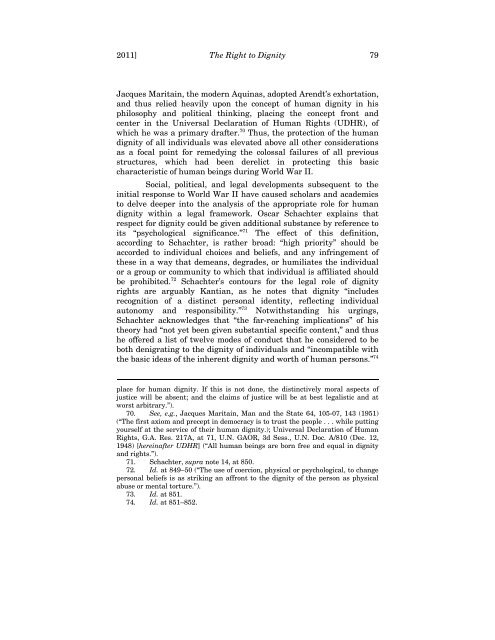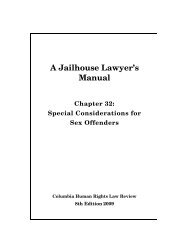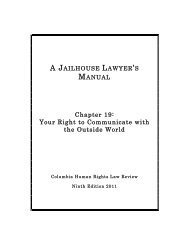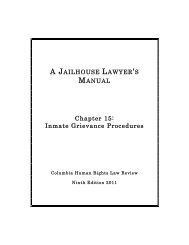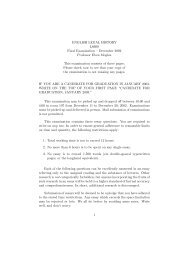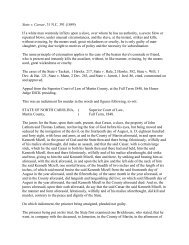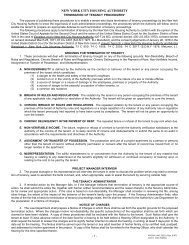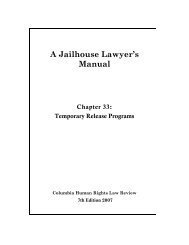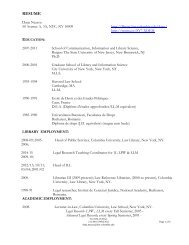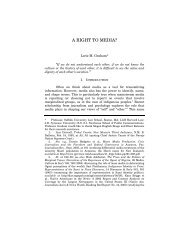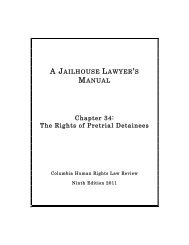The Right to Dignity Rex D. Glensy - Columbia Law School
The Right to Dignity Rex D. Glensy - Columbia Law School
The Right to Dignity Rex D. Glensy - Columbia Law School
Create successful ePaper yourself
Turn your PDF publications into a flip-book with our unique Google optimized e-Paper software.
2011] <strong>The</strong> <strong>Right</strong> <strong>to</strong> <strong>Dignity</strong> 79<br />
Jacques Maritain, the modern Aquinas, adopted Arendt’s exhortation,<br />
and thus relied heavily upon the concept of human dignity in his<br />
philosophy and political thinking, placing the concept front and<br />
center in the Universal Declaration of Human <strong>Right</strong>s (UDHR), of<br />
which he was a primary drafter. 70 Thus, the protection of the human<br />
dignity of all individuals was elevated above all other considerations<br />
as a focal point for remedying the colossal failures of all previous<br />
structures, which had been derelict in protecting this basic<br />
characteristic of human beings during World War II.<br />
Social, political, and legal developments subsequent <strong>to</strong> the<br />
initial response <strong>to</strong> World War II have caused scholars and academics<br />
<strong>to</strong> delve deeper in<strong>to</strong> the analysis of the appropriate role for human<br />
dignity within a legal framework. Oscar Schachter explains that<br />
respect for dignity could be given additional substance by reference <strong>to</strong><br />
its “psychological significance.” 71 <strong>The</strong> effect of this definition,<br />
according <strong>to</strong> Schachter, is rather broad: “high priority” should be<br />
accorded <strong>to</strong> individual choices and beliefs, and any infringement of<br />
these in a way that demeans, degrades, or humiliates the individual<br />
or a group or community <strong>to</strong> which that individual is affiliated should<br />
be prohibited. 72 Schachter’s con<strong>to</strong>urs for the legal role of dignity<br />
rights are arguably Kantian, as he notes that dignity “includes<br />
recognition of a distinct personal identity, reflecting individual<br />
au<strong>to</strong>nomy and responsibility.” 73 Notwithstanding his urgings,<br />
Schachter acknowledges that “the farreaching implications” of his<br />
theory had “not yet been given substantial specific content,” and thus<br />
he offered a list of twelve modes of conduct that he considered <strong>to</strong> be<br />
both denigrating <strong>to</strong> the dignity of individuals and “incompatible with<br />
the basic ideas of the inherent dignity and worth of human persons.” 74<br />
place for human dignity. If this is not done, the distinctively moral aspects of<br />
justice will be absent; and the claims of justice will be at best legalistic and at<br />
worst arbitrary.”).<br />
70. See, e.g., Jacques Maritain, Man and the State 64, 10507, 143 (1951)<br />
(“<strong>The</strong> first axiom and precept in democracy is <strong>to</strong> trust the people . . . while putting<br />
yourself at the service of their human dignity.); Universal Declaration of Human<br />
<strong>Right</strong>s, G.A. Res. 217A, at 71, U.N. GAOR, 3d Sess., U.N. Doc. A/810 (Dec. 12,<br />
1948) [hereinafter UDHR] (“All human beings are born free and equal in dignity<br />
and rights.”).<br />
71. Schachter, supra note 14, at 850.<br />
72. Id. at 849–50 (“<strong>The</strong> use of coercion, physical or psychological, <strong>to</strong> change<br />
personal beliefs is as striking an affront <strong>to</strong> the dignity of the person as physical<br />
abuse or mental <strong>to</strong>rture.”).<br />
73. Id. at 851.<br />
74. Id. at 851–852.


